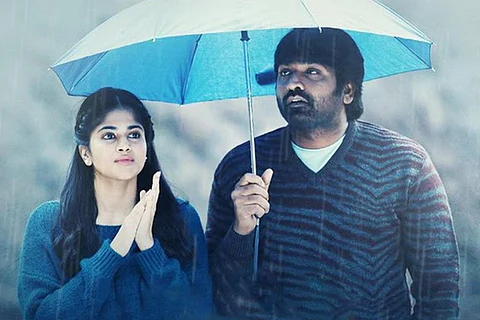

The Tamil cinema industry is going through an Eelam phase it would seem. The latest addition is Yaadhum Oore Yaavarum Kelir starring Vijay Sethupathi. Condemnation from real-life Eelam Tamils, on the other hand, about how Kollywood portrays the war and genocide they survived continues to go unheard. While Yaadhum Oore breaks away from one trope that has received immense criticism – the saviour hero from across the seas in Tamil Nadu – it still flounders in telling a story that is not ours to tell.
Vijay Sethupathi (popularly called VJS) plays Punithan, an Eelam refugee with a mysterious past. He’s an aspiring musician repeatedly thwarted from achieving his dreams by the network of constricting laws in India that govern refugees, the oppressive police, and an indifferent society. The actor manages a less-than-passable imitation of the Eelam Tamil dialect, so for most of the film he speaks in Tamil that is heard here in Tamil Nadu. His character is given a believable reason to do so. That’s one of the few aspects of the plot that appear at least vaguely interested in logical storytelling.
When the film isn’t giving us convoluted plot twists, it busies itself with recreating the violence of the Sri Lankan Civil War. The film predictably opens to scenes of trauma, particularly the trauma of the sexual assault of a Eelam Tamil woman. The assault, we learn later, becomes a crucial plot point in driving the story forward.
Whether it is caste atrocities, sexual assault of women, or any other traumatic experience, why, why is it that filmmakers consistently fail to understand that graphic depictions are not the only way to reach audiences? These are lazy tricks employed by writers who depend on sensationalism rather than compassion in order to register their politics.
That aside, what director Venkata Krishna Roghanth does manage to get right is turning the gaze inwards too: how does India, and particularly Tamil Nadu that purportedly has solidarity for Tamils in Sri Lanka, actually treat Eelam refugees? How oppressively do the refugee camps in Tamil Nadu function? What kind of life are these refugees allowed to lead? For example, the movie points out how refugees from Sri Lanka are banned from enrolling for medical degrees. What kind of futures can children born in refugee camps expect to have when they too are considered refugees? How should we react to decisive laws such the Citizenship Amendment Act (CAA) – to which the film makes a veiled reference – when they infringe on human dignity?
All these are excellent points to make. It is truly daring of the director to make them in times of censorship and vindictiveness from the state apparatus. Unfortunately, all of these points are mostly made in VJS’s final dialogues directed at the audience. The actor delivers them flawlessly with a conviction that truly feels personal. For those who have been keenly following VJS’s career, it’s easy to see that he genuinely believes in progressive ideals, yet why he chooses scripts that routinely do disservice to both his stellar capabilities as an actor and to the causes they talk about remains baffling.
Until we reach the ending of the film when pertinent questions regarding the treatment of Eelam refugees are asked, little of the plot is engaging. Worse still, the multiple plot twists make little sense. Weighing all this down is a supporting cast whose emotional range is so limited it’s hard to tell what exactly they’re feeling. Particularly grating is the way Punithan’s love interest Matilda (Megha Akash) is written, as is her performance. At one point I texted a friend suggesting that Matilda’s characterisation is even more of a ‘loosu ponnu’ Kollywood trope than the self-critical parody version in Tamizh Padam 2 (2018). Also, for reasons best known to the director, Matilda’s nickname is semmari kutty, meaning lamb.
The film’s title refers to an ancient Tamil poem that’s now become a popular adage. ‘Yaathum oore, yaavarum kelir’ can loosely be translated to ‘All places are my hometown, all people are my kin.’ This film genuinely wants to make an appeal for inclusivity and connection across identities. It’s a timely sentiment now more than ever. It’s deeply unfortunate that its ideals are let down by a poor script and a badly conceived story.
Disclaimer: This review was not paid for or commissioned by anyone associated with the series. Neither TNM nor any of its reviewers have any sort of business relationship with the producers or any other members of its cast and crew.
Watch: The ‘loosu ponnu’ of Tamil cinema: Who she is and why she should retire